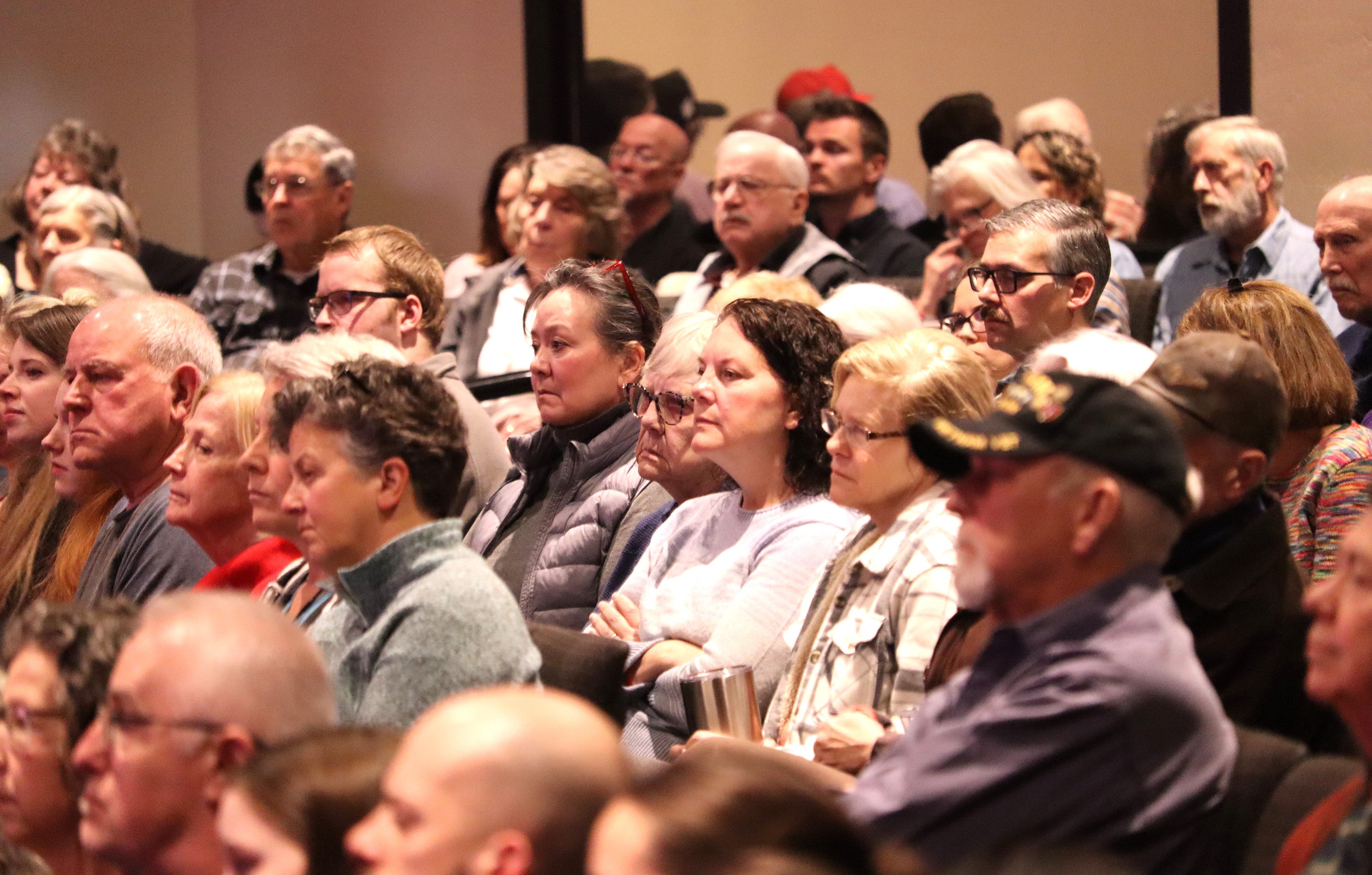Legislators talk chemtrails at town hall in Coeur d’Alene
Harold Brazil came to Saturday’s legislative wrap-up hoping he might hear talk of eliminating the state’s grocery tax.
“It just doesn’t make sense to have it,” the Coeur d’Alene man said.
He also hoped he might hear discussion on eliminating or reducing property taxes, or perhaps limiting how much they can increase year to year. He said that as property taxes have climbed, they have taken an especially big toll on seniors on fixed incomes.
“I have to pay more out of my pocket,” he said. “That hurts.”
Brazil suggested increasing the sales tax could help make up the difference in the state budget.
“That might be a more fair distribution for everybody,” he said.
Brazil was one of about 500 people who attended the town hall that went more than two hours at Candlelight Christian Fellowship with 10 legislators on hand. It was orderly and respectful, with no outbursts and plenty of security present.
Organizers asked attendees to write down questions so they could read them to legislators, rather than have them asked verbally.
Discussions covered the usual subjects, including property taxes, education, individual rights, medical ethics, parental rights, DEI restrictions and decreasing the size of government.
One question that received long answers was whether legislators would support doing something about chemtrails, a topic rarely raised at public meetings.
Rep. Vito Barbieri said, “It’s more complex than it needs to be because of the cloud seeding done by Idaho Power” to create rainfall.
“It’s not the same substance that is being used,” he said.
Barbieri said the state can’t control what the Federal Aviation Administration already controls.
“How can the state stop them from flying over their airspace and dropping these chemicals or spraying them?” he asked.
Barbieri said it wasn’t a matter of whether legislators would support taking on chemtrails, but rather, if there would be any value to it.
“It’s got to be done on a federal level. Something is going on,” he said. “It’s definitely affecting our gardens. It’s definitely affecting the soil. It’s definitely affecting what we’re breathing.”
“We very seldom have a nice, blue sunny day. There’s no question about it,” Barbieri added.
Rep. Joe Alfieri said cloud seeding in Idaho is done for agricultural purposes and to improve snowpack.
“If we ban weather modification, we ban cloud seeding,” he said, adding there is significant resistance on that from the agricultural industry.
“We have enough water here, but they need it in the southwestern part of the state to help with crops,” he said.
Alfieri said two bills addressing the matter gained no traction this year.
They called for defining cloud seeding, limiting it to certain areas and only to be used for agricultural purposes, not weather modification, and providing an annual report “so we can understand what is going on and what the effects are.”
Alfieri said the biggest challenge is convincing the southern part of the state that “we have a problem in the north that our blue skies are no longer blue all day long as they used to be.”
He said it would be a long, difficult process.
“The agricultural and water interests in the state are very, very strong,” Alfieri said. “It is an uphill battle.”
One question asked legislators to address how to reduce illegal immigration to Idaho.
Rep. Jordan Redman said he introduced a bill last year that would require employers to have mandatory electronic verification of legal status of employees. It was held up in committee, so he proposed it again this year, but it did not get a hearing.
“I think that would be a logical step forward,” he said.
Jordan said he is working with Sen. Phil Hart on a bill to limit welfare benefits for people in Idaho illegally.
“I think that would demagnetize our state,” he said.
Redman co-sponsored House Bill 109, which would require the Idaho Department of Health and Welfare to seek federal approval to exclude candy and soda from foods eligible for coverage by the federal Supplemental Nutrition Assistance Program, or SNAP.
The bill is awaiting Gov. Brad Little’s consideration.
Asked to cite abuses of SNAP, Redman said soda pop is the No. 1 commodity bought through the program.
“I think we can all agree there’s nothing nutritious about soda,” he said.
Sen. Ben Toews said more than 20% of food stamps go toward junk food.
He said children in households utilizing SNAP consume 43% more sugar-sweetened beverages than nonparticipating households with similar income levels.
“It’s a serious problem and this is a significant fix,” he said.
Three women, as they left the town hall, said they liked what they heard from legislators.
“They were very transparent,” one woman said.



